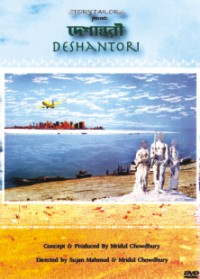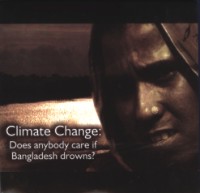|
Documentary
No Place like Home
Hana Shams Ahmed
Shopnobhumi: The Promised Land
Directed by Tanvir Mokammel
 A recent High Court order finally concluded that members of Bangladesh's “Bihari Camps” (otherwise known as “Geneva Camp” or camps for “Stranded Pakistanis”) had a right to Bangladeshi citizenship. In light of these recent events, Shopnobhumi is an important insight into this community's struggle over the last 37 years. A recent High Court order finally concluded that members of Bangladesh's “Bihari Camps” (otherwise known as “Geneva Camp” or camps for “Stranded Pakistanis”) had a right to Bangladeshi citizenship. In light of these recent events, Shopnobhumi is an important insight into this community's struggle over the last 37 years.
The documentary follows the plight of three generations of people living in camps across the country. It portrays the suffering of a three-decade-long state of limbo without citizenship -- neither Bangladeshi nor Pakistani. It was the 1947 Partition riots, which triggered the mass displacements of families from Pakistan to India, and vice versa. For the Urdu-speaking partition refugees who settled in East Pakistan, the 1971 liberation war produced the independent nation of Bangladesh and changed their fate again. Pakistan which had earlier promised to be a safe haven for all Muslims of the region suddenly did not want these Urdu speakers. Neither did the newly independent Bangladesh want to accept them as refugees.
Mokammel deals with a very sensitive issue in the film, which speaks about a community of people who are still seen as 'collaborators' of the Pakistan Army. Although the film recognises the Bangali emotion, by talking to people who were attacked by members of this community in 1971, it also points out that 70% of the Urdu-speakers who live in camps were born after 1971. A collective disregard from media, human rights activists and government mean that they are being punished for crimes they have never committed.
In camps in Mirpur and Mohammadpur, where a large section of this community lives, the provisions are minimal. Three generations of families live in a single room. Sometimes this room is also their workplace -- where they do embroidery work on saris for a very small wage. Mokammal explores the issue from different angles. He follows the protagonist of the film Khaled through his personal journey of living without a nationality. At one point Khaled and his friends share their confusion about filling up their university admission form. In the space for nationality they wonder what they should write. There are poignant stories of families separated forever -- some managing to get to Pakistan during earlier repatriation, after which the process stopped. The research for the film is extensive -- Mokammel travels to 'Bihari camps' all over Bangladesh and speaks to members of displaced families living in Pakistan to showcase the human side of this issue.
Shopnobhumi is an excellent history lesson about a misunderstood issue. Anwar Hossain's camera work guides a very moving film.
Deshantori: The Migrant
Directed by Sujan Mahmud and Mridul Chowdhury
 Deshantori addresses a very important social issue of our country -- migration. The documentary explores the circumstances under which young people become desperate enough to immigrate illegally to another country. One of the directors, Mridul Chowdhury, talks to people from different backgrounds and socio-economic groups to find out what it is that inspires people to leave their country of birth and fly to a foreign land, without Deshantori addresses a very important social issue of our country -- migration. The documentary explores the circumstances under which young people become desperate enough to immigrate illegally to another country. One of the directors, Mridul Chowdhury, talks to people from different backgrounds and socio-economic groups to find out what it is that inspires people to leave their country of birth and fly to a foreign land, without
even clearly knowing what they expect to get from there.
He finds that most people who are frustrated with the education and work opportunities in this country tend to think of the collective 'abroad' as a utopia for quality of life. One person mentions how getting a job is like getting the magic lamp. In a country where it's impossible to get a job without connections, the interviewee imagines going to a country where skill is given first preference. Many women express their frustration at not being able to advance themselves in a conservative society. Getting out of the country seems like a better career option for all these people. Most students who were interviewed were clearly not happy with the education system here. In their view going to another country for academic purposes was the only way they expected to have an edge in the competitive, increasingly global, job market.
The documentary follows the shocking story of 26 Bangladeshi men who tried to immigrate to Spain through the Sahara Desert and the Mediterranean Sea. Without food and drinking water, and witnessing the deaths of their partners one by one, it is ultimately the survival of the bravest. In the process they are even forced to resort to cannibalism. The documentary investigates how lack of social justice and economic opportunities force people into taking such desperate measures. It is poignant that one of the protagonists, even after going through such an ordeal, says that given an opportunity he would take another chance to go abroad.
Climate Change: Does Anybody
Care if Bangladesh Drowns?
Directed by Afsan Chowdhury
 Does anybody indeed care if Bangladesh drowns? From this 24-minute documentary by Afsan Chowdhury, it seems very few do. The documentary was filmed during one of the worst floods to have ravaged the country in recent times, in August 2007. Chowdhury visits the Northern part of the country, which faces two climate extremes every year. Each monsoon, a better part of the Northern region goes right under water. Ironically this comes right after the near-famine condition of monga, when rains don't come for weeks. These climate extremes are getting worse each year and despite warnings from environmentalists, little seems to be done in the way of reducing carbon emissions from the industrial world, especially the US, which is one of the biggest polluters of the world. Bangladesh, riddled with corruption and slow economic development combined with geography and climate, is especially vulnerable to climate change. While the US spent an estimated 2 trillion dollars on the war in Iraq, there is no visible desire from the industrialised world to invest to prevent ill effects of climate change. Does anybody indeed care if Bangladesh drowns? From this 24-minute documentary by Afsan Chowdhury, it seems very few do. The documentary was filmed during one of the worst floods to have ravaged the country in recent times, in August 2007. Chowdhury visits the Northern part of the country, which faces two climate extremes every year. Each monsoon, a better part of the Northern region goes right under water. Ironically this comes right after the near-famine condition of monga, when rains don't come for weeks. These climate extremes are getting worse each year and despite warnings from environmentalists, little seems to be done in the way of reducing carbon emissions from the industrial world, especially the US, which is one of the biggest polluters of the world. Bangladesh, riddled with corruption and slow economic development combined with geography and climate, is especially vulnerable to climate change. While the US spent an estimated 2 trillion dollars on the war in Iraq, there is no visible desire from the industrialised world to invest to prevent ill effects of climate change.
Bangladesh is bordered on the west, north and east by India, on the south-east by Myanmar, and on the south by the Bay of Bengal. Most of the country is low-lying land. With the building of the Farakka Barrage in 1975, Bangladesh's water supply problems have worsened. The diversion of the Ganges River water into the Hooghly River during the dry season has raised salinity levels, contaminated fisheries, hindered navigation, and poses a threat to water quality and public health. Afsan Chowdhury explores the consequences of these and other factors that are threatening the very existence of the country.
.Copyright
(R) thedailystar.net 2008 |
